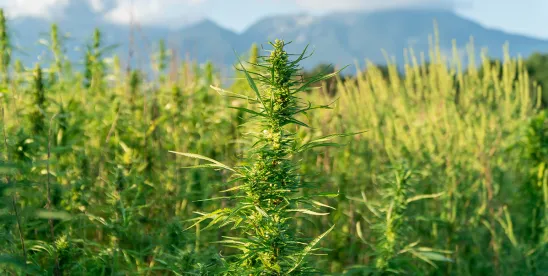On January 7, 2025, the U.S. Court of Appeals for the Fourth Circuit upheld Virginia Senate Bill (SB) 903, which was signed into law in 2023 and regulates the sale of hemp products based on their total tetrahydrocannabinol (THC) concentration, regardless of whether the THC is delta-9 (the psychoactive component of marijuana) or delta 8, any other form of THC.
Following the passage of the 2018 Farm Bill, “hemp” is excluded from the definition of marijuana, which is listed under the Controlled Substances Act (CSA). Hemp is defined in the 2018 Farm Bill as any part of the cannabis plant, including derivatives, that do not have more than 0.3% delta-9 THC. Thus, under the CSA, hemp products containing 0.3% or less delta-9 THC are not subject to penalties even if they contain higher levels of other forms of THC such as delta-8 THC, which is also psychoactive.
Responding to concerns about the absence of regulation of these other forms of THC and reports of adverse events with delta-8 THC in children, Virginia passed SB 903 which prohibited the retail sale of hemp products containing a total THC concentration greater than 0.3% and prohibiting hemp processors from selling hemp to a person the processor knows or has reason to know will use those products in a way that violates the total THC limit.
Plaintiffs brought suit and alleged that the Virginia law was (1) preempted by the 2018 Farm Bill and (2) violated the Dormant Commerce clause. On these issues, the 4th Circuit upheld the lower court’s decision and held that the Virginia law was not preempted and did not violate the dormant commerce clause.
Regarding preemption, while the court recognized that the statutory notes indicated that the 2018 Farm Bill does not prohibit interstate commercial distribution of hemp, it held that law “says nothing about the ability of states to regulate the sale of hemp products within their borders.” Indeed, with respect to production, the 2018 Farm Bill was explicit in allowing States to regulate the production of hemp in a more stringent manner. The Court also held that field preemption did not apply and that in fact the 2018 Farm Bill had expressly carved out a substantial role for state regulation. Finally, the Court rejected the Plaintiff’s argument that the Farm Bill had intended to create a national hemp market or that the Virginia law conflicted or created an obstacle to the purpose of the 2018 Farm Bill.
Regarding the dormant commerce clause, the Court held that there was no discrimination between in and out of state economic interests (the law applied equally to in and out of state actors) and that it also did not unjustifiability burden the flow of interstate commerce as would otherwise be required to find a dormant commerce clause violation.



 />i
/>i

